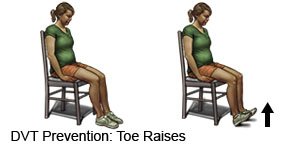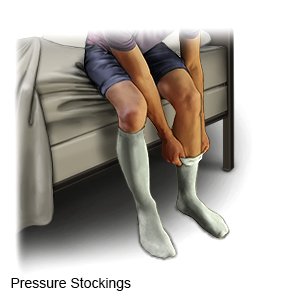Hypercoagulation
Medically reviewed by Drugs.com. Last updated on Apr 2, 2024.
Hypercoagulation is a condition that causes your blood to clot more easily than normal. Hypercoagulation can be an acquired or inherited condition. Acquired hypercoagulation is caused by a disease or other condition. Examples include obesity, pregnancy, use of birth control pills, or cancer. Inherited coagulation is caused by genes that have been passed to you from a parent. These genes cause problems with how your blood clots. You may have no signs or symptoms of hypercoagulation until you get a blood clot.
DISCHARGE INSTRUCTIONS:
Call your local emergency number (911 in the US) or have someone else call if:
- You have any of the following signs of a stroke:
- Numbness or drooping on one side of your face
- Weakness in an arm or leg
- Confusion or difficulty speaking
- Dizziness, a severe headache, or vision loss
- You have any of the following signs of a heart attack:
- Squeezing, pressure, or pain in your chest
- You may also have any of the following:
- Discomfort or pain in your back, neck, jaw, stomach, or arm
- Shortness of breath
- Nausea or vomiting
- Lightheadedness or a sudden cold sweat
Return to the emergency department if:
- Your arm or leg feels warm, tender, and painful. It may look swollen and red.
Call your doctor if:
- You have a fever or chills.
- You have hard, bulging veins on your arms or legs.
- You have skin changes, such as wounds or reddish blue spots.
- You have questions or concerns about your condition or care.
Medicines:
You may need any of the following:
- Blood thinners help prevent blood clots. Clots can cause strokes, heart attacks, and death. Many types of blood thinners are available. Your healthcare provider will give you specific instructions for the type you are given. The following are general safety guidelines to follow while you are taking a blood thinner:
- Watch for bleeding and bruising. Watch for bleeding from your gums or nose. Watch for blood in your urine and bowel movements. Use a soft washcloth on your skin, and a soft toothbrush to brush your teeth. This can keep your skin and gums from bleeding. If you shave, use an electric shaver. Do not play contact sports.
- Tell your dentist and other healthcare providers that you take a blood thinner. Wear a bracelet or necklace that says you take this medicine.
- Do not start or stop any other medicines or supplements unless your healthcare provider tells you to. Many medicines and supplements cannot be used with blood thinners.
- Take your blood thinner exactly as prescribed by your healthcare provider. Do not skip does or take less than prescribed. Tell your provider right away if you forget to take your blood thinner, or if you take too much.
- Antiplatelets , such as aspirin, help prevent blood clots. Take your antiplatelet medicine exactly as directed. These medicines make it more likely for you to bleed or bruise. If you are told to take aspirin, do not take acetaminophen or ibuprofen instead.
- Take your medicine as directed. Contact your healthcare provider if you think your medicine is not helping or if you have side effects. Tell your provider if you are allergic to any medicine. Keep a list of the medicines, vitamins, and herbs you take. Include the amounts, and when and why you take them. Bring the list or the pill bottles to follow-up visits. Carry your medicine list with you in case of an emergency.
Treatment options
The following list of medications are related to or used in the treatment of this condition.
Prevent a blood clot:
- Change your body position often during travel and at work. If you travel by airplane, get up and walk around once every hour. Move and stretch in your seat several times each hour. Do leg exercises at work and during travel to increase blood flow through your legs.
- Point your toes toward your shin. Then point them toward the ground. Do this 10 times every hour.


- Pull each knee to your chest and hold it for 15 seconds. Then straighten your leg. Do this 10 times every hour.
- Point your toes toward your shin. Then point them toward the ground. Do this 10 times every hour.
- Change your position every 2 hours in bed. If you need help to move, ask other family members to help you change your position.
- Eat a variety of healthy foods. Healthy foods can help you manage your weight and other health problems. Examples include fruits, vegetables, whole-grain breads, low-fat dairy products, beans, lean meats, and fish. Ask if you need to be on a special diet.

- Drink plenty of liquids. Liquids can help prevent dehydration. Ask how much liquid to drink each day and which liquids are best for you. You should drink extra liquids before plane rides and long car rides.
- Get plenty of exercise. Talk to your healthcare provider about the best exercise plan for you. Exercise can help you lose weight, keep your heart healthy, and help manage other conditions.

- Do not smoke. Nicotine and other chemicals in cigarettes and cigars can heart and lung damage. Ask your healthcare provider for information if you currently smoke and need help to quit. E-cigarettes or smokeless tobacco still contain nicotine. Talk to your healthcare provider before you use these products.
- Wear pressure stockings as directed. These are tight elastic stockings that squeeze the lower part of your legs to improve circulation. This helps keep blood clots from forming. Ask your healthcare provider where to buy these products.

- Talk to your healthcare provider before you get pregnant. You may need to take medicine to prevent blood clots during your pregnancy.
Follow up with your doctor as directed:
Write down your questions so you remember to ask them during your visits.
© Copyright Merative 2024 Information is for End User's use only and may not be sold, redistributed or otherwise used for commercial purposes.
The above information is an educational aid only. It is not intended as medical advice for individual conditions or treatments. Talk to your doctor, nurse or pharmacist before following any medical regimen to see if it is safe and effective for you.
Learn more about Hypercoagulation
Treatment options
Care guides
Further information
Always consult your healthcare provider to ensure the information displayed on this page applies to your personal circumstances.
